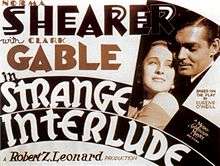Strange Interlude (film)
| Strange Interlude | |
|---|---|
 | |
| Directed by | Robert Z. Leonard |
| Based on |
Strange Interlude by Eugene O'Neill |
| Starring |
Norma Shearer Clark Gable |
| Cinematography | Lee Garmes |
| Edited by | Margaret Booth |
| Distributed by | Metro-Goldwyn-Mayer |
Release dates |
|
Running time | 109 minutes |
| Country | United States |
| Language | English |
| Budget | $654,000[1] |
| Box office | $1,237,000[1] |
Strange Interlude is a 1932 American pre-Code drama film directed by Robert Z. Leonard and released by Metro-Goldwyn-Mayer. The film stars Norma Shearer and Clark Gable, and is based on the play Strange Interlude by Eugene O'Neill. It is greatly shortened from the play: the stage production lasts six hours and is sometimes performed over two evenings, while the film runs the usual two hours.
Plot
Gordon Shaw was a flyer who was shot down and killed during World War I. Nina (Norma Shearer) would have married him before he left, but her father forbade the marriage. Charlie (Ralph Morgan) is a friend, but Nina does not love him; and he is too timid, too shy, to tell her the way he feels about her. Sam (Alexander Kirkland) is her husband, but her love for him disappears after the ceremony, when she finds out that there is mental illness in his family and that there can be no children.
To have the child she wants, but cannot have with Sam, she has a secret affair with Ned (Clark Gable), who wants her to leave Sam. Gordon Evans (Robert Young) is the result of the affair, but he does not know Ned is his real father. Nina continues to play with the emotions of all three men and devote herself only to Gordon.
Cast (in credits order)
- Norma Shearer as Nina Leeds
- Clark Gable as Dr. Ned Darrell
- Alexander Kirkland as Sam Evans
- Ralph Morgan as Charlie Marsden
- Robert Young as Gordon Evans (as a young man)
- May Robson as Mrs. Evans
- Maureen O'Sullivan as Madeline Arnold
- Henry B. Walthall as Professor Leeds
- Mary Alden as Mary (the Leeds' maid)
- Tad Alexander as Gordon Evans (as a child)
Production Notes
When MGM boss Irving Thalberg bought the movie rights to the play, he initially wanted Lynn Fontanne, who played Nina Leeds on Broadway, to play the lead, with her husband Alfred Lunt as Dr. Ned Darrell. But they were not interested in making movies, so Thalberg decided to use his wife Norma Shearer and Clark Gable instead. At first, Gable was intimidated by the story's material, but he gave it his best effort and, subsequently, received a very positive reaction from all who were involved.[2]
Box office
According to MGM records, the film earned $957,000 in the US and Canada and $280,000 elsewhere, resulting in a profit of $90,000.[1]
